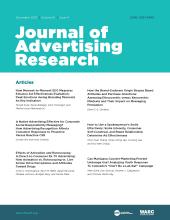Abstract
This study experimentally tested the effects of animation versus rotoscoping versus live action in direct-to-consumer television advertising on outcomes, including risk and benefit perceptions and attitudes toward the drug. The authors used an online panel to recruit participants with chronic dry eye (n = 504) and psoriasis (n = 490). The study found no effects of animation or rotoscoping on perceptions of drug risk or benefit, comprehension, or behavioral intentions. Animated advertisements, however, resulted in more negative attitudes than live-action or rotoscoped advertisements. Future research should explore whether animated advertisements are recalled better over time or have any lagged effects on perceptions.
- Received April 11, 2019.
- Received (in revised form) April 3, 2020.
- Accepted October 29, 2020.
- Copyright © 2021 ARF. All rights reserved.
ARF MEMBERS
If you are a member of the Advertising Research Foundation, you can access the content by logging in here
Log In
Pay Per Article - You may access this article (from the computer you are currently using) for 30 days for US$20.00
Regain Access - You can regain access to a recent Pay per Article purchase if your access period has not yet expired.





